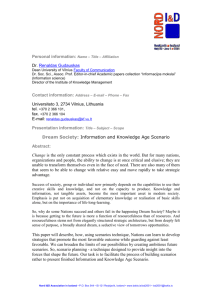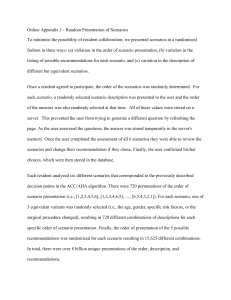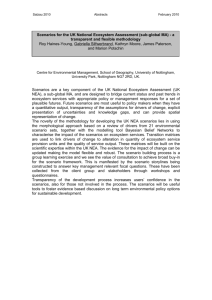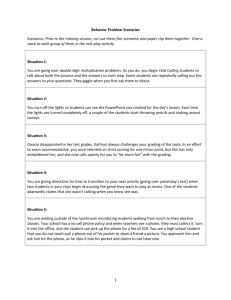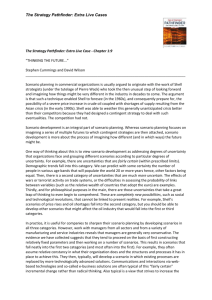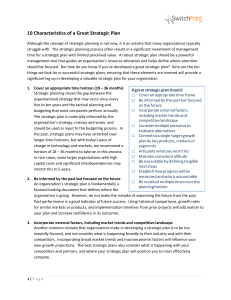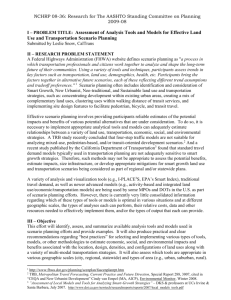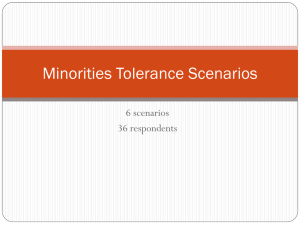Scenario planning - The Management Centre
advertisement
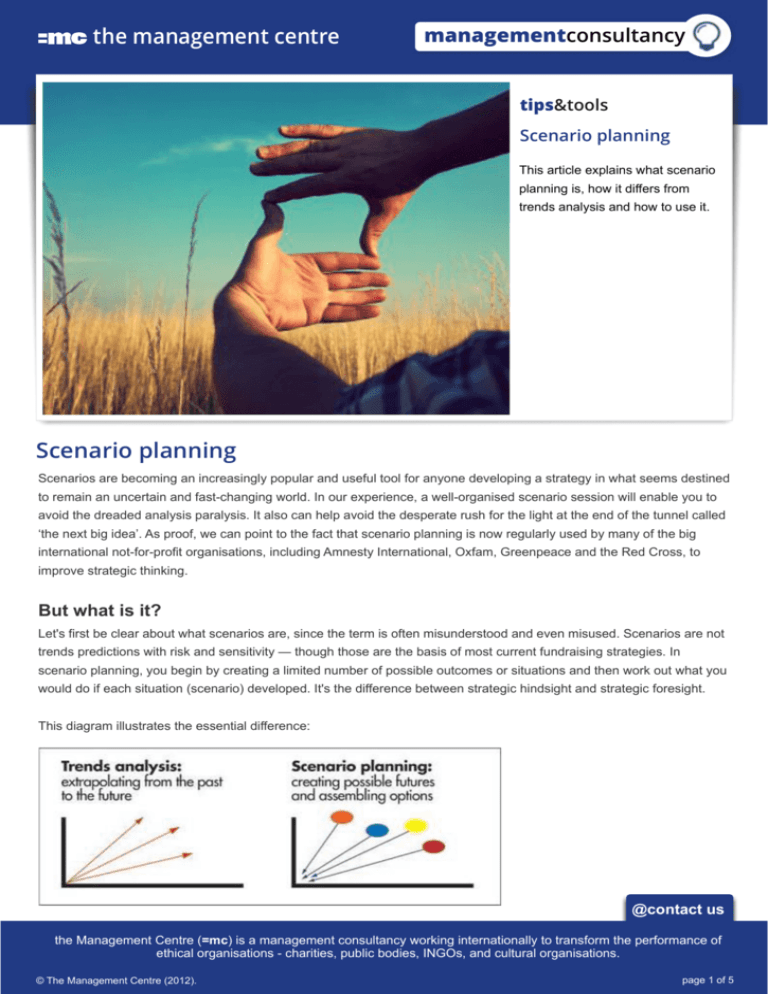
the management centre managementconsultancy tips&tools Scenario planning This article explains what scenario planning is, how it differs from trends analysis and how to use it. Scenario planning Scenarios are becoming an increasingly popular and useful tool for anyone developing a strategy in what seems destined to remain an uncertain and fast-changing world. In our experience, a well-organised scenario session will enable you to avoid the dreaded analysis paralysis. It also can help avoid the desperate rush for the light at the end of the tunnel called ‘the next big idea’. As proof, we can point to the fact that scenario planning is now regularly used by many of the big international not-for-profit organisations, including Amnesty International, Oxfam, Greenpeace and the Red Cross, to improve strategic thinking. But what is it? Let's first be clear about what scenarios are, since the term is often misunderstood and even misused. Scenarios are not trends predictions with risk and sensitivity — though those are the basis of most current fundraising strategies. In scenario planning, you begin by creating a limited number of possible outcomes or situations and then work out what you would do if each situation (scenario) developed. It's the difference between strategic hindsight and strategic foresight. This diagram illustrates the essential difference: @contact us the Management Centre (=mc) is a management consultancy working internationally to transform the performance of ethical organisations - charities, public bodies, INGOs, and cultural organisations. © The Management Centre (2012). page 1 of 5 the management centre managementconsultancy This fundamental difference is important since, in one case, you start from what you know and work out toward the future. And in the second, you begin from what might be possible and work back to what you know. Focus Advantages Conventional planning Scenario planning • • Explores how current trends might extrapolate and how organisational strategy would need to would need to change or transform align or adjust accordingly • It is a well-established approach • It is what most organisations do and it is safe (ish) • Emphasises business as almost usual Disadvantages • • • Imagines possible futures and how strategy • Is an emerging method designed to energise thinking • May allow real insights and unlock creativity • Allows for business outside the box May stop you identifying discontinuous change • This approach is not as well known Can encourage blindsiding or fixed thinking • Not many charities or not-for-profits do it May put energy into lost causes • May absorb energy on unlikely possibilities Scenarios in practice One practical example from The Management Centre (=mc)'s own work might help show the value of scenarios. Just weeks before the London terrorist bombings of July 7, 2005, =mc was hired by the mayor of London to conduct a scenario exercise into how the city would raise and distribute money in the event of a disaster. Working with the Red Cross and others, we looked first at a number of possible "what if" scenarios: • a sudden flood • a fire or earthquake • a terrorist attack • a plane or train crash (Note: London already had excellent plans to deal with the medical victims of an event. But there had been no plan to help raise money for the victims, nor to determine how to distribute any money raised quickly and efficiently.) We also looked at the difference between something that resulted in a small number of people being harmed — say, a school bus full of children — and something that resulted in many people being harmed, like the crowd at a soccer game. We then assessed the implications of these scenarios in terms of fundraising and fund distribution. @contact us the Management Centre (=mc) is a management consultancy working internationally to transform the performance of ethical organisations - charities, public bodies, INGOs, and cultural organisations. © The Management Centre (2012). page 2 of 5 the management centre managementconsultancy A starting point was to work alongside the Red Cross internationally to study the fundraising work that had been done during the September 11, 2001, attacks and the 2002 bombings in Bali, as well as other disasters. Sadly, as we now know, there had been little advance planning for those "improbable" situations. From this data, we created, with the Red Cross, a number of scenarios that we could use to plan. Some of these were deliberately extreme, and they ran the gamut from 20,000 people killed in a bomb blast at a soccer game to 10 members of the U.K. cabinet being injured after a flood on the Thames. We were looking at the implications for the amounts of money that might be raised and how that money should and would be distributed. (One important learning from September 11, for example, was that giving the money away in a way that was seen as equitable and proper was much more difficult than raising it.) Sadly, our work was put into practice all too soon when bombers struck literally weeks after we had started it. Suddenly, something that had seemed like an interesting project turned into a very real, practical challenge. The scenarios work, and the planning associated with it, proved invaluable as a massive fundraising and then funds-distribution campaign were set up. The learning from our work have been written up with the British Red Cross and shared around the world. The scenarios were important in this process since they raised issues that we were then able to anticipate and plan for. Some of the learning was obvious, such as how many telephone lines were needed to cope with 2,000/5,000/10,000 calls a minute. And how many people would give online versus how many would send cheques versus how many would turn up at banks with cash. But there were other, more surprising lessons. One example came from a scenario we explored on the implications if something relatively contained happened in London during high tourist season. We predicted there would be a huge response from companies and by fellow tourists who wanted to help victims. We also, sadly, anticipated some traders would try to take advantage of the situation and people's sympathy by producing "fundraising" T-shirts, etc., where only a very limited amount of cash went to the cause. As a result of this scenario, the planning group prepared a sophisticated licensing system in advance to make sure corporate support was managed ethically. The system actually proved invaluable in the real situation when corporate support was significant. Using scenarios Scenarios are helpful in enabling you to get out of the couch-potato mind-set of business-as-usual. In 2009 we launched a project to help fundraisers look past the current gloomy economic climate, where all the trends data look depressing. This ‘Global Fundraising Scenarios Project’ was designed to get fundraisers to take a longer-term view distinct from the day-today, month-to-month or even year-to-year grind, and learn from an increasingly international body of knowledge. The result was a data set to help fundraisers worldwide plan for a number of different versions of fundraising in 2020. You can read the highlights and results of this project in a related article. In 2010 we launched a second scenarios project, ‘Scenarios for Change’, to encourage and support senior thought leaders within international NGOs to think longer term about the future of civil society actors. You can explore this project at www.scenariosforchange.com. @contact us the Management Centre (=mc) is a management consultancy working internationally to transform the performance of ethical organisations - charities, public bodies, INGOs, and cultural organisations. © The Management Centre (2012). page 3 of 5 the management centre managementconsultancy Scenarios workout? Think of scenarios as a mental workout for you and your organisation. They give you three kinds of exercise that conventional planning approaches don't offer. That makes them better in helping you get fit and plan for uncertainty. 1. Scenarios stretch Scenarios force you to stretch your thinking. Often in scenarios you develop two extreme options. So imagine what would be the effect of a 50-percent cut in your fundraising investment budget or a doubling to 200 percent. Imagine if we repeated the exercise so this time you had to fundraise with 25 percent of your current staff team or with four times the number of people. How would that change what's possible? This exercise helps liberate your mind and strategy. 2. Scenario scan In exercise, you need to look around and notice what's happening or you can hurt yourself. We often don't imagine things that then come to pass and overtake us. Think of the poor Pony Express people riding hard to move letters in five days across the U.S. — entirely ignorant of the telegraph men putting up poles. They were blindsided in the same way Polaroid was blindsided by digital photography. In many ways Kiva completely blindsided all of the big international not-for-profit organisations running "adopt a child" programmes. Their basic "$20-a-month adoption" mechanic seemed destined to last forever. But Kiva created a whole new way of thinking among donors that essentially eliminated the charity middleman and connected adults in a more equal way. Many groups are now trying — very late in the day — to launch a "me too" response. 3. Scenario swing A swing is a defined, predicable movement. Well-developed scenarios don't just identify possible outcomes; they might help you work out probable results or situations. The process of describing or analysing data to identify possibilities could make one outcome seem very likely. The logic of the data could make logical narrative sequences of events seem almost inevitable. Pierre Wack, one of the lead planners at Shell oil company — the commercial scenario-planning pioneer — called this logical narrative "predetermined outcomes." He used the example of the 1,500-mile-long Ganges river in India. A heavy rain in the Himalayas would lead, he said, certainly to a water rush in Allahladad and then inevitably to a flood in Benares at the end of the water journey on the plains. One good fundraising example of such a "predetermined outcome" is donor demographics. Changes in donor population, even if a long way off, can by and large be predicted. So it is possible to consider the effects of life longevity on size of legacies/bequests. But how many charities have developed a real response to the implications of reduced income through bequests as donors find they need the money themselves to pay for advanced health care or residential support? If you haven't yet included scenario planning in your strategic fitness program, you should — or live with flabby thinking and its strategic health consequences. @contact us the Management Centre (=mc) is a management consultancy working internationally to transform the performance of ethical organisations - charities, public bodies, INGOs, and cultural organisations. © The Management Centre (2012). page 4 of 5 the management centre managementconsultancy What’s next? IIf you’ve found this article helpful and you would like more information, please call +44 (0)20 7978 1516 and speak to one of our experienced management consultants. This download and its contents may not be reproduced without permission from the authors. Permission will be granted for small – run reproduction and circulation within not-for-profit organisations. @contact us the Management Centre (=mc) is a management consultancy working internationally to transform the performance of ethical organisations - charities, public bodies, INGOs, and cultural organisations. © The Management Centre (2012). page 5 of 5
